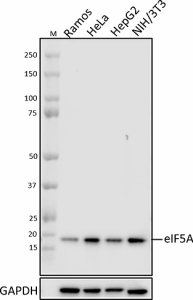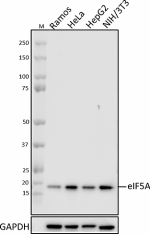- Clone
- W19057C (See other available formats)
- Regulatory Status
- RUO
- Other Names
- EIF5A1, EIF-4D, Eukaryotic Initiation Factor 5A Isoform 1, Eukaryotic Initiation Factor 5A
- Isotype
- Rat IgG2a, κ
- Ave. Rating
- Submit a Review
- Product Citations
- publications

-

Whole cell extracts (15 µg total protein) from the indicated cells were resolved by 4-12% Bis-Tris gel electrophoresis, transferred to a PVDF membrane, and probed with 0.25 µg/mL purified anti-eIF5A antibody (clone W19057C) overnight at 4°C. Proteins were visualized by chemiluminescence detection using HRP goat anti-rat IgG antibody (Cat. No. 405405) at a 1:3000 dilution. Direct-Blot™ HRP anti-GAPDH antibody (Cat. No. 649203) was used as a loading control at a 1:50000 dilution (lower). Lane M: Molecular weight marker.
| Cat # | Size | Price | Quantity Check Availability | Save | ||
|---|---|---|---|---|---|---|
| 945601 | 25 µg | £81 | ||||
| 945602 | 100 µg | £201 | ||||
Eukaryotic initiation factor 5A (eIF5A) is a translation factor that aids in the process of translation elongation. Binding to the “E” site of the ribosome, eIF5A helps promote the synthesis of nascent polyproline motifs whose characteristic side-chain rigidity would otherwise prevent efficient translation and cause ribosomal stalling. Efficient polyproline translation requires post-translational hypusination of eIF5A at lysine residue 50, a modification unique to eIF5A and eIF5A2. eIF5A is required for normal autophagic flux due to the presence of a polyproline motif in the TFEB transcription factor. Low levels of the hypusine precursor spermidine are linked to increased aging, causing decreased TFEB synthesis and autophagic processes by way of downregulated eIF5A hypusination. eIF5A has been implicated in pancreatic ductal adenocarcinoma (PDAC), the most common form of pancreatic cancer. Here, eIF5A is hypothesized to increase the expression of migration-associated proteins, ultimately resulting in PDAC metastasis. eIF5A has also been connected to HIV-1 pathogenesis by promoting its replication and is a potential target for antiretroviral therapy.
Product DetailsProduct Details
- Verified Reactivity
- Human, Mouse
- Antibody Type
- Monoclonal
- Host Species
- Rat
- Immunogen
- Synthetic peptide corresponding to human eIF5A
- Formulation
- Phosphate-buffered solution, pH 7.2, containing 0.09% sodium azide
- Preparation
- The antibody was purified by affinity chromatography.
- Concentration
- 0.5 mg/mL
- Storage & Handling
- The antibody solution should be stored undiluted between 2°C and 8°C.
- Application
-
WB - Quality tested
- Recommended Usage
-
Each lot of this antibody is quality control tested by western blotting. For western blotting, the suggested use of this reagent is 0.1 - 1.0 µg/mL. It is recommended that the reagent be titrated for optimal performance for each application.
- Application Notes
-
This clone was tested for ICC using 4% PFA-fixed HeLa cells and NIH/3T3 cells permeabilized with either methanol or Triton X-100, and methanol-fixed and permeabilized HeLa cells and NIH/3T3 cells. None of these methods were compatible with eIF5A staining.
This clone failed to enrich eIF5A from HeLa extracts when tested for IP.
This clone may cross-react with eIF5A2 due to high homology between the immunizing sequence and the corresponding region of eIF5A2. - RRID
-
AB_2892514 (BioLegend Cat. No. 945601)
AB_2892514 (BioLegend Cat. No. 945602)
Antigen Details
- Structure
- EIF5A is a 154 amino acid protein with a predicted molecular weight of 17 kD.
- Distribution
-
Ubiquitously expressed/Cytosol
- Function
- Translational elongation
- Biology Area
- Cell Biology, Protein Synthesis
- Antigen References
-
- Fujimura K, et al. 2015. J Biol Chem. 295:29907-19.
- Gutierrez E, et al. 2013. Mol Cell. 51:35-45.
- Hoque M, et al. 2009. Retrovirology. 6:90.
- Zhang H, et al. 2019. Mol Cell. 76:110-125.
- Gene ID
- 1984 View all products for this Gene ID
- UniProt
- View information about eIF5A on UniProt.org
Related Pages & Pathways
Pages
Related FAQs
Other Formats
View All eIF5A Reagents Request Custom Conjugation| Description | Clone | Applications |
|---|---|---|
| Purified anti-human eIF5A | W19057C | WB |
Compare Data Across All Formats
This data display is provided for general comparisons between formats.
Your actual data may vary due to variations in samples, target cells, instruments and their settings, staining conditions, and other factors.
If you need assistance with selecting the best format contact our expert technical support team.
-
Purified anti-human eIF5A

Whole cell extracts (15 µg total protein) from the indicated...
 Login / Register
Login / Register 







Follow Us